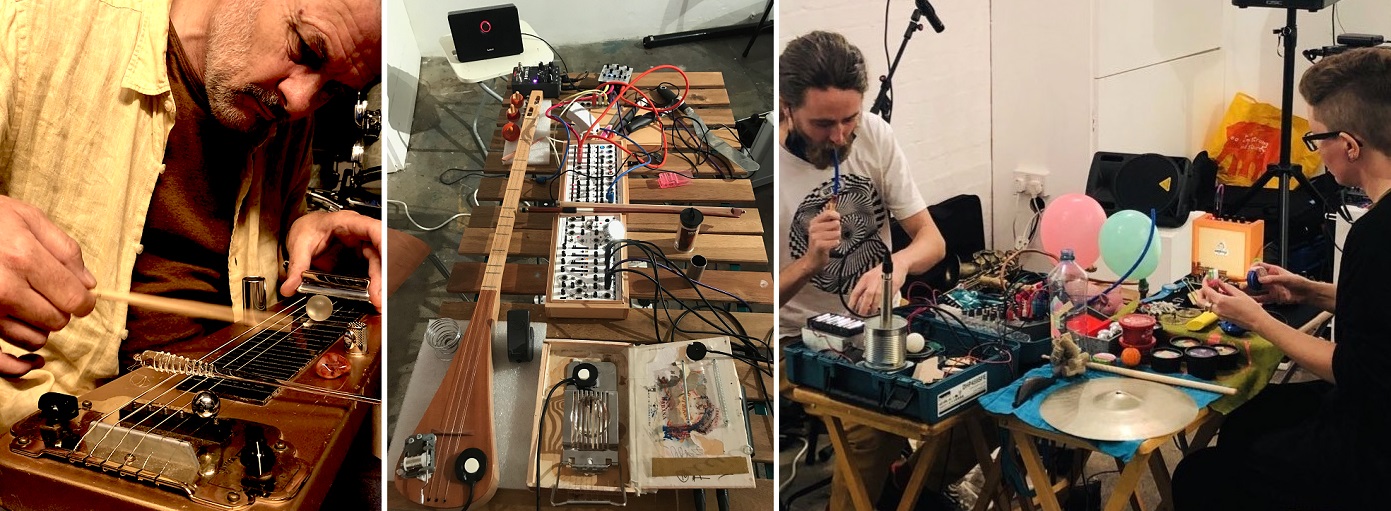 Two duos and a quartet:
Two duos and a quartet:
John Bisset – lap steel guitar & objects
Phil Durrant – dulcimer stick & amplified objects
+
Cath Roberts – objects, DIY percussion instruments, drum kit parts, Nebulophone synthesiser, plastic pipe with alto saxophone mouthpiece.
Sam Andreae – no-input mixer, homemade matrix mixer/amp, speakers, coils, objects, saxophone, whistles.
Doors 7.30 | music 8pm | entry £8 cash
John Bisset
I like using my hands – to make visual art – to make music.
I was improvising when I was 15, in 1975, as part of the Manchester Musicians Collective. Song-making came in later, by way of New Wave bands, and I’ve continued playing both improvised and structured music (with groups like the London Improvisers Orchestra and London Electric Guitar Orchestra falling between, utilising conduction and graphic scores to design the improvisation.)
In 2022 two things happened – one of my own volition; quitting nicotine – the other imposed on me; tendonitis and arthritis, meaning that to play guitar was painful and very different as I had lost my grip. I dug out an old lap steel that I owned and since May I have been exploring a horizontal and more percussive soundworld – much to my delight.
I mention the nicotine quit because it seems that without the drug I cannot focus on written pieces, (a guitar instrumental tunes band I was putting together has been abandoned) but that the satellite dish – the openness to being and becoming so necessary for improvisation – is more receptive than ever, so, once more, I return to my first-loved music, my hands occupied in new and intriguing ways, play-ready.
www.johnbisset.net
Phil Durrant
Born near London in 1957, Phil Durrant is a multi-instrumentalist improviser/composer/sound artist who currently performs solo and group concerts.
As a violinist (and member of the Butcher/Russell/Durrant trio), he was one of the key exponents of the ‘group voice approach’ style of improvised music. In the late 90s, his trio with Radu Malfatti and Thomas Lehn represented a shift to a more ‘reductionist’ approach.
Recently, he has been performing solo and duo concerts with Bill Thompson, Mark Wastell, as well as his seven-piece group ‘If Herbie Went West Coast’, using a modular synthesizer system. As a mandolinist, he has been performing with guitarist Martin Vishnick, mandolinist Richard Scott and drummer Emil Karlsen.
Durrant still performs regularly with the acoustic/electronic group Trio Sowari (with Bertrand Denzler and Burkhard Beins) and Mark Wastell’s The SEEN.
sowarimodular
Cath Roberts and Sam Andreae
Usually found playing saxophones together, Cath Roberts and Sam Andreae started experimenting with lots of tabletop noise-making at their shared studio space in Lewisham in 2020. Since then they have started playing together live in this format, and their tape ‘Miaow Argument’ (December 2021) is available on the Sound Holes label.
cathrobots.bandcamp.com/album/miaow-argument
www.samandreae.com
cathrobots.co.uk
Cath Roberts
Cath Roberts’ work explores free improvisation, composition and the music at their meeting point. Her primary outlet as a composer and improviser on baritone saxophone is the band Sloth Racket, which has toured widely and released several albums. As bandmate, Cath is a member of several groups including Madwort Sax Quartet, Article XI and MoonMot. She has a long-standing duo with guitarist Anton Hunter (Ripsaw Catfish), as well as regular collaborations with Tullis Rennie, Benedict Taylor, Otto Willberg, Seth Bennett and others. Cath co-runs LUME with Dee Byrne, producing concerts, tours and festivals since 2013 and releasing music on their offshoot label Luminous. With Tom Ward and Colin Webster she organises BRÅK, an improvised music series taking place in Brockley, South East London
Sam Andreae (born in Manchester) has been active across Europe over the last decade as a saxophonist, composer and organiser. Through improvisation and composition he explores a music of colliding sound gestures and aural detritus, built up from an intentionally fractured instrumental language and playful spontaneity. His compositions place a focus on gestural processes which in their unraveling reveal a trail of sound artefacts to be picked through.
“what Sam Andreae does is liminal music, he shows you the clicks, the noises, the breaths, the rattle and hum” – John Doran, Quietus, 2017 on BBC 3 Late Junction

